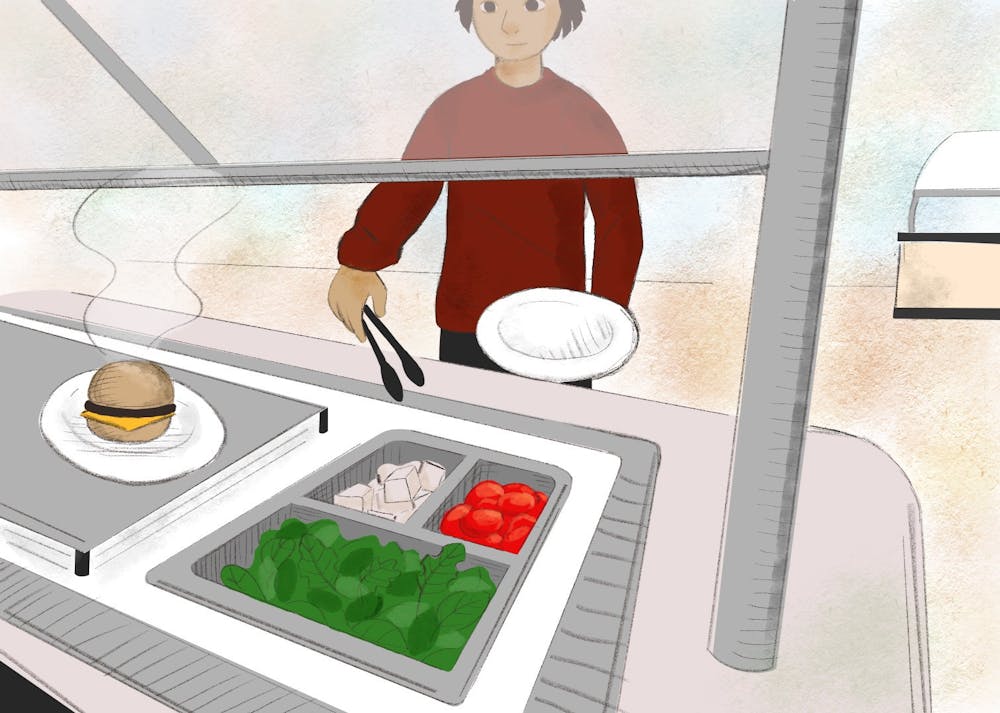When students begin their collegiate journey, they have to navigate the food options the campus has to offer. Individuals adapt to the food environment differently, depending on factors that include nutritional goals and dietary restrictions.
Some students on the Tempe campus said they felt concerned about the options of nutrient-dense foods available. Many felt frustrated about the lack of choice in both dining halls and other dining establishments.
"(Food options are) probably the most important thing," said Adem Mezouari, a senior studying biomedical sciences. "You have to make sure you get the right amount of nutrition, electrolytes (and) right amount of everything for your body to run as quickly as it can."
Mezouari is the vice president of outreach for Nourished, a student organization on campus that promotes healthy lifestyles and consumption of organic ingredients.
Nourished is often involved in panel discussions, community farm partnerships and conferences around campus with a goal to help Sun Devils make informed food decisions.
Rey Nganga, a member of Nourished and a sophomore studying information technology, said students should have a voice in the decision to bring food or vendors on campus.
Mezouari and Nganga emphasized the difficulties that arise when students have to go farther distances to find healthy options — which are oftentimes more expensive.
Madison Morris, a sophomore studying environmental engineering, also struggles with finding adequate options on campus, but for a different reason. Morris was recently diagnosed with Celiac disease, preventing her from consuming most forms of gluten.
Morris described her on-campus dining experience as "frustratingly limited," pointing out the lack of options present in the Memorial Union. Morris said in a written statement that she frequently finds herself looking at fewer options on the Chick-fil-A or Qdoba menu, and she imagines other students do the same.
"There are some decent options," Morris said in a statement. "More options not on the unhealthy, fast food side of things would be appreciated."
READ MORE: Meal swipes are out, M&G is in
Students with food allergies also face extra challenges to meet their personal dietary needs. Sabrina Silos, a freshman studying justice studies, has several life-threatening food allergies that greatly affect how she engages with the University.
Based on her experience from her first week at ASU, Silos said people with food allergies are "set up for failure." Silos said she did not feel comfortable advocating for herself, and she also felt the meals from her dining hall were not safe for her to eat.
"The cross-contamination was so blatant," Silos said. "I actually toured the dining facility itself and I realized it wasn't safe for the severity of my food allergies."
The University said there are numerous ways students can find information about how to accommodate their dietary needs.
"With thousands of students on campus, there is no doubt some will have varying dietary needs," a University spokesperson said in a written statement. "We have made available many dining and food options to accommodate students as much as possible. Anyone with unique needs not addressed with the current dining options, should email sundevildining@asu.edu."
Silos got a meal plan exemption, which gave her accommodations to ensure her safety. However, those provisions led her to eat most of her meals alone in her room which, to her, felt isolating and lonely.
"With food allergies, exclusivity is normal," Silos said. "As a result, people who do not have food allergies don't have exposure to people who do and that creates a lot of negative assumptions."
To combat the restrictive nature of the dining situation at ASU, Silos said she wants ASU to increase awareness and transparency.
"Having a better understanding of (allergies) would be good within the faculty level, but also the staff and the dining hall," Silos said.
She also said she wants ASU faculty to have more sensitivity toward students who have specific accommodations.
"You cannot tell just by looking at somebody that they have food allergies," Silos said. "It's something that you have to learn about people, (something) that you have to be curious about."
Silos also started a club on campus for students to join together and increase awareness and advocacy for allergies and dietary restrictions on campus. The club is named after the first exclusionary practice children may experience: The Allergy Table.
"The most important thing about the club is the openness and the ability to discuss," Silos said. "At the end of the day, discussing, raising awareness and giving people a chance to tell their stories, that's all we can do."
Edited by Senna James, Sophia Ramirez, and Katrina Michalak.
Reach the reporters at kagore1@asu.edu and emalvar9@asu.edu and follow @kategore_17 on X.
Like The State Press on Facebook and follow @statepress on X.
Kate is a freshman studying journalism and mass communication. This is her second semester with The State Press.
Emilio is a sophomore studying journalism and mass communication and political science. This is his first semester with The State Press.




